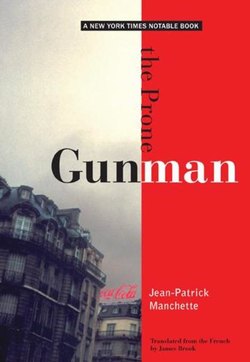Читать книгу The Prone Gunman - Jean-Patrick Manchette - Страница 10
Оглавление6
He remembered. Anne Freux had promised to wait ten years for him.
“I’m asking you for ten years,” said Martin. “It could be less if I’m lucky. If not, I’ve calculated it will take me ten years.”
Anne swore that she would wait for him. She tearfully kissed him. She was sixteen and a half. Martin was eighteen—tall, strong, stupid, and calculating. His calculations weren’t intelligent, either.
He said goodbye to Dédé that same night. He said nothing to his father. Charles Terrier had arrived in Nauzac a little after the Second World War, accompanied by his pregnant wife and his pal Dédé. The two men had just made themselves a little nest egg in scrap and rags, especially in the salvaging of non-ferrous metals. That was the era when junk dealers, large and small, most of them Auvergnats, were battling to see who would salvage the most military surplus. They greased palms, schemed, often stole from one another, sometimes even exchanged gunshots. Charles Terrier took a Mauser rifle bullet in the head, and it stayed there, sometimes provoking a kind of attack, especially if he had been drinking. He stopped drinking. According to Dédé, he had been a pretty clever fellow before his wound. Then he married a nag and let Dédé convince him to leave the Paris area—where things had started to get too hot for them in variety of ways—and move to the Southwest to get into the mink-raising business.
“A clean life,” said Dédé. “You’ll be your old self again.”
The minks died, the money was lost, Martin was born, and his mother packed up and left with a truck driver who had spent two days in Nauzac on account of a busted axle. The mother left Martin behind. Charles Terrier brought up the kid the hard way. Dédé also took care of the kid, and he was more affable and easygoing. Later, when Charles Terrier wanted to put his son to work, it was Dédé who convinced him to send the kid to the lycée, instead. It was also Dédé who took Martin to Paris one weekend for his sixteenth birthday and got him initiated by a prostitute in the vicinity of the Madeleine. He gave him a moped, too.
At the lycée, Martin hung out with bourgeois kids who borrowed his moped. It was the moped that got him in with the children of the rich, and then he fell madly in love with Anne Freux, who had expensive clothes and sheer dark stockings and wore Guerlain perfumes.
Everyone wanted to get Anne Freux, who just laughed, tossed her hair, and slipped out of reach. Martin paid rather a lot for a mail-order muscle-building course. But he had no success with the girls of the group, who found him a little vulgar. He made up for it elsewhere; he even had an affair with a girl working for the Freux company. But a girl like that didn’t satisfy his imagination.
Nevertheless, one Saturday evening when Anne had asked him to take her home after a party where they had danced to Miles Davis, she and he kissed violently, then Martin said that if she’d asked him to take her home it was only to get rid of the others. She was indignant. He said he was embarrassed at his humble origins, and she was indignant again. She said that she found Martin much more colorful than the others, and she said that it was precisely because of his social background and because the others were spoiled children, but not him—he was acquainted with real-life problems, he worked in the summer instead of going on vacation, he had to struggle to elevate himself, and all that, she said finally, made him deeper and more mature.
But when Martin slipped his tongue in her mouth, she seemed surprised, and when he tried to feel her up, she pulled away and said good night and disappeared, a little flushed, into the posh little apartment house that would later have a West Indian concierge.
